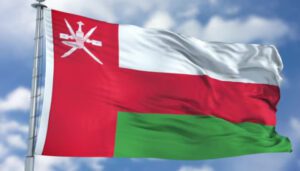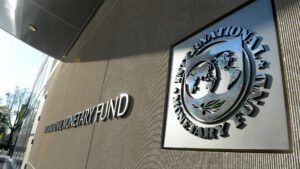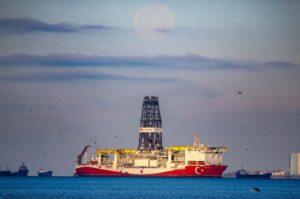
The dollar is moderately declining against the euro, but growing against the Japanese yen, renewing its maximum value in 24 years.
The ICE-calculated index, which shows the performance of the US dollar against six currencies (the euro, Swiss franc, yen, Canadian dollar, pound sterling and the Swedish krona), is practically unchanged on Wednesday morning, as is the broader WSJ Dollar.
The euro/dollar pair is trading at $0.9721 by 8:52 p.m. compared to $0.9707 at the close of the session on Tuesday, the euro adds about 0.1%.
Meanwhile, the rate of the American currency against the yen rose by almost 0.3% and amounted to 146.25 yen compared to 145.86 yen the day before. This is the highest rate since August 1998. The last time the yen fell to a 24-year low at the end of September, after which the Japanese Ministry of Finance intervened in the foreign exchange market to support the national currency.
The dollar is strengthening against the yen due to mixed monetary policy rates: while the Fed is actively raising interest rates, the Bank of Japan continues to adhere to extremely soft monetary policy.
The pound rose 0.4% to $1.1012 compared to $1.0968 at the close of the previous session.
Traders are evaluating conflicting signals about the Bank of England’s emergency government bond purchase program.
British Central Bank Chairman Andrew Bailey said that the regulator will complete the purchase of bonds on Friday, as planned. “The essence of interventions to stabilize financial markets is partly that this is a temporary phenomenon,” he said.
However, the Financial Times then wrote, citing three anonymous sources, that the Central Bank privately hinted to representatives of some banks about the possibility of extending the bond purchase program in order to protect UK pension funds from losses.

The government of Ukraine has included participation in approximately 70 foreign exhibitions in the list of works and services, for import operations of which the National Bank is recommended to ensure the implementation of transfers, the Ministry of Economy has reported.
“The list, drawn up based on the results of a dialogue with industry associations and enterprises, includes about 70 specific exhibitions that will be held abroad in autumn 2022 – spring 2023. For example: Ukrainian Infrastructure Forum of Strategy Council in London, Fruit Logistica in Berlin, Agrotech 2023 in Polish Kielce,” the ministry said on its website.
There is also an opportunity for Ukrainian manufacturers to participate in international exhibitions of the furniture industry, international medical and pharmaceutical exhibitions.
The Ministry of Economy recalled that in September, Ukrainian exports of goods rose to a record high since the beginning of the war: $4.114 billion.

First Deputy Chairman of the Verkhovna Rada Oleksandr Kornienko invited Oman to consider the possibility of participating in the restoration of Ukrainian regions affected by Russian aggression.
According to the press service of the office of the Verkhovna Rada, Kornienko made such a proposal during a meeting with a delegation headed by Chairman of the Advisory Council of the Sultanate of Oman Khalid Al-Maawali at the site of the Assembly of the Inter-Parliamentary Union in Kigala (Rwanda).
He also called for the creation of inter-parliamentary friendship groups.
“The creation of inter-parliamentary friendship groups will be an important first step to enhance cooperation between the legislative bodies of Ukraine and Oman,” Kornienko said.
The First Deputy Speaker of the Ukrainian Parliament invited members of the Omani delegation to take part in the first parliamentary summit of the Crimea Platform in Zagreb at the end of October.

The coronation ceremony of King Charles III of Great Britain will take place on May 6 next year, Buckingham Palace announced on Tuesday.
“Buckingham Palace is delighted to announce that the coronation of His Majesty the King will take place on Saturday 6 May 2023,” the royal residence said in a statement.
The ceremony at Westminster Abbey will be officiated by the Archbishop of Canterbury.
In addition, Queen Consort Camilla is crowned along with Charles III.
Queen Elizabeth II died on September 8 at Balmoral Castle in Scotland at the age of 96. On September 10, the Council of Succession proclaimed her son as the new monarch of the United Kingdom of Great Britain and Northern Ireland, Charles III.

The International Monetary Fund (IMF) left unchanged its July forecast for global economic growth in 2022 – 3.2% (in January, an increase of 4.4% was expected, in April – by 3.6%). For 2023, the estimate is lowered to 2.7% from 2.9% in July and 3.6% in April (in January, the IMF predicted global GDP growth of 3.8%).
“The global economy continues to face serious challenges caused by the lingering impact of three powerful forces: the Russian invasion of Ukraine, the “cost of living crisis” caused by persistent and increasing inflationary pressures, and the slowdown in China. (…) GDP of countries representing more than a third of the world economy will contract in 2023, while the three largest economies – the US, the European Union and China – will continue to slip. In short, the worst is yet to come, and for many, 2023 will feel like a recession,” the report says.
Russia’s war against Ukraine has triggered an energy crisis in Europe that is drastically increasing the cost of living and hindering economic activity, the IMF writes. “Gas prices in Europe have more than quadrupled since 2021, with Russia cutting deliveries to less than 20% of 2021 levels, raising the possibility of power shortages next winter and beyond. More broadly, the war has also pushed up food prices on world markets, despite the recent decline in prices following the Black Sea grain deal, which has caused severe hardship for low-income families around the world, especially in low-income countries.
The report also notes that sustained and rising inflationary pressures have caused a rapid and synchronized tightening of monetary conditions, along with strong dollar appreciation against most other currencies. “Tighter global monetary and financial conditions will affect the economy, reducing demand and helping to gradually curb inflation. However, so far, price pressures remain quite persistent and are of great concern to policymakers. We expect global inflation to peak at the end of 2022, but will remain high for longer than previously expected, falling to 4.1% by 2024.
COUNTRY ASSESSMENTS
The IMF insignificantly, but still improved its forecast for the growth of the economies of emerging markets and developing countries for 2022 – to 3.7% from 3.6% (in April it expected 3.8%), for 2023 – lowered to 3. 7% from 3.9% (April – 4.4%).
The growth forecast for the Chinese economy this year has been worsened to 3.2% from 3.3% (in April, an increase of 4.4% was expected, in January – by 4.8%), in 2023 – to 4.4% from 4 .6% (April estimate – 5.1%).
India’s GDP growth estimate has also been reduced to 6.8% from 7.4% (April – 8.2%) in 2022, and remained unchanged for 2023 – 6.1% (April – 6.9%).
At the same time, the growth forecast for the Brazilian economy has been significantly increased for 2022 – up to 2.8% from 1.7% in July and 0.8% in April, for 2023 it has also been increased – up to 1% from up to 0.9% (April forecast – 1.4%).
The estimate of GDP growth in developed countries in 2022 is worsened by 0.1 percentage points – up to 2.4% (April – 3.5%) and by 0.3 percentage points. – up to 1.1% – in 2023 (2.4% – April estimate).
The IMF continued to reduce the forecast for US GDP growth in 2022 – by 0.7 percentage points. to 1.6% (April – 3.7%). The following year, the estimate remained the same – 1% (April – 2.3%).
The economy of the eurozone countries this year, according to the IMF, will grow by 3.1%, the forecast has been improved from 2.6% in July and 2.8% in April). For 2023, the estimate is downgraded by 0.7 p.p. – up to 0.5% (April – 2.3%).
Italy’s 2022 GDP growth forecast has been raised to 3.2% from 3% in July and 2.3% in April. In 2023, the IMF expects the economy to decline by 0.2%, in July it predicted an increase of 0.7%, in April – by 1.7%.
The German economy in 2022 will grow, according to the IMF, only by 1.5% (better than the July forecast – 1.2%). At the same time, in 2023, the economy is expected to decline by 0.3% (in July, an increase of 0.8% was expected, in April – by 2.7%).
The forecast for Spain for the current year has been raised to 4.3% from 4% (in April – 4.8%) and lowered to 1.2% from 2% in 2023.
For France, the estimate for the current year has been improved to 2.5% from 2.3% and by 0.4 percentage points, for 2023 it has been worsened to 0.7% from 1%.
The growth forecast for the UK economy for 2022 has been improved to 3.6% from 3.2%, for 2023 it has been worsened to 0.3% from 0.5%. Japan’s GDP growth estimate for the current year remained at the level of 1.7%, for 2023 it decreased to 1.6% from 1.7%.

Ankara intends to produce oil and gas in the waters of Libya within the framework of the energy agreement concluded by Turkey with this country, Turkish President Recep Tayyip Erdogan said.
“After the agreement on hydrocarbons signed by us with Libya, we will cooperate in a new area – in the extraction of oil and other resources from the Libyan continental shelf,” Bloomberg quotes him as saying.
Erdogan also announced plans to double the capacity of the Trans-Anatolian gas pipeline (TANAP), which runs from Azerbaijan through Georgia and Turkey to Greece.
Bloomberg recalls that Ankara and the administration of Abdel Hamid al-Dbeiba concluded this agreement last week: he was supposed to leave the post of prime minister after December 25, 2021, but did not do this, citing the disruption of the presidential elections in Libya. As a result, the Prime Minister of another Libyan government, Fathi Bashaga, rejected this agreement, emphasizing that al-Dbeiba does not have the authority to conclude agreements with foreign states.
At the same time, the current agreements are based on the 2019 agreement that Ankara concluded with the previous internationally recognized government of Libya, and to which Turkey provided military assistance in the confrontation with the forces of Marshal Khalifa Haftar.
In turn, the EU said that the new agreement does not comply with the UN Convention on the Law of the Sea and violates the interests of third parties. Also, Greece, Cyprus and Egypt regard the agreement as an attempt by Turkey to dominate the waters of the region.
In Libya, for a long time, there were two bodies of executive power in parallel: the Government of National Accord in Tripoli, in the west of the country, and an interim cabinet in the east of the country, supported by the army of Marshal Khalifa Haftar. According to Western media, Haftar’s forces were supported by Russia, France, Saudi Arabia, the United Arab Emirates, Egypt, Greece and Cyprus. On the side of the government in Tripoli, in turn, were Turkey, Qatar and Italy.
In October 2021, in Geneva, representatives of the warring parties signed an agreement on a permanent ceasefire. The presidential elections in Libya, the first after the overthrow and assassination of Muammar Gaddafi, were scheduled for December 24, 2021, but in the end the vote did not take place. This was due to controversy surrounding the electoral law.
GAS, OIL, PRODUCTION, TURKEY